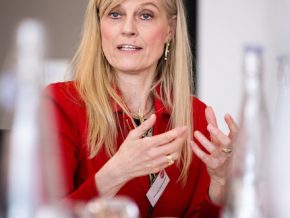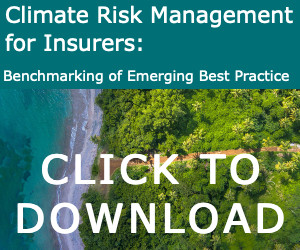COMMENT
 The European Commission recently announced the second wave of countries interested in Solvency II equivalence. However, some jurisdictions have chosen a different way. Fiona Le Poidevin, Deputy Chief Executive of Guernsey Finance, explains why the Island has chosen to say no to equivalence.
The uncertainty surrounding the introduction of Solvency II and its practical implications for the insurance industry is causing some angst around Europe. However, in Guernsey, we have opted for certainty. The Island is not part of the EU so we are not required to adopt the regulation and our Government and the financial services regulator issued a joint statement in January 2011 to say that the Island doesn’t have any plans to seek equivalence under Solvency II.
Solvency II has been designed to address systemic and group risks within commercial insurance markets but these are risks not generally faced by Guernsey-based international insurance companies, where a large proportion of captive insurance companies are based. Under the current proposals, Solvency II is set to impose a blanket set of capital requirements. Therefore equivalence would burden Guernsey insurers with additional costs and render currently effective captive business plans uneconomic.
The announcement that we have no current plans to seek equivalence not only provides certainty to our clients and potential clients but it ensures that we will be able to continue to offer an alternative set of products and services. Guernsey will continue to meet the standards of the International Association of Insurance Supervisors (IAIS) – in January 2011, the IMF commended the Island for having high levels of compliance with the 28 insurance core principles of the IAIS – however, its proportionality principles mean that we will provide a more attractive environment for captive owners and other niche insurers.
There has been positive feedback to this decision from captive owners already using Guernsey, as well as potential clients. Indeed, figures show that the Guernsey Financial Services Commission (GFSC) licensed 72 international insurers during 2011 – a 53% increase from the 47 approved during 2010. These were across the range of entities from conventional captive insurance companies, PCCs (Protected Cell Companies), ICCs (Incorporated Cell Companies) and in particular, PCC and ICC cells.
We believe that this growth in new business is the result, at least in part, of our decision not to seek equivalence with Solvency II. Indeed, Guernsey’s proposition may be attractive for captive owners and their insurance vehicles currently based within EU domiciles, especially where they are writing business outside the EU. This may become increasingly so if the uncertainty regarding Solvency II continues and/or if the implications for captives appear particularly onerous.
Other non-EU jurisdictions such as Bermuda, Switzerland and Japan are adopting a different stance. These countries were in the first wave of equivalence applications, but were not seeking equivalence for their captives, but to protect their international commercial reinsurance industries. Bermuda in particular is seeking to mitigate the impact on their captive insurance business. We continue to monitor these developments closely.
At present there is still a degree of uncertainty surrounding equivalence and what this means for these countries. We understand that the finalisation of the transitional provisions may depend on the actions of the European Parliament and the European Council. Until their position is understood, there will remain a degree of uncertainty about the equivalence process and how it will progress. On this basis, Guernsey remains committed to the policy outlined in January 2011 that it is not currently seeking equivalence under Solvency II.
This is a position which has so far served us well and we believe offers captive owners a real alternative that will deliver them tangible benefits. There is another way.
—
The author is Deputy Chief Executive at Guernsey Finance. The views expressed are the author’s own.
]]>
The European Commission recently announced the second wave of countries interested in Solvency II equivalence. However, some jurisdictions have chosen a different way. Fiona Le Poidevin, Deputy Chief Executive of Guernsey Finance, explains why the Island has chosen to say no to equivalence.
The uncertainty surrounding the introduction of Solvency II and its practical implications for the insurance industry is causing some angst around Europe. However, in Guernsey, we have opted for certainty. The Island is not part of the EU so we are not required to adopt the regulation and our Government and the financial services regulator issued a joint statement in January 2011 to say that the Island doesn’t have any plans to seek equivalence under Solvency II.
Solvency II has been designed to address systemic and group risks within commercial insurance markets but these are risks not generally faced by Guernsey-based international insurance companies, where a large proportion of captive insurance companies are based. Under the current proposals, Solvency II is set to impose a blanket set of capital requirements. Therefore equivalence would burden Guernsey insurers with additional costs and render currently effective captive business plans uneconomic.
The announcement that we have no current plans to seek equivalence not only provides certainty to our clients and potential clients but it ensures that we will be able to continue to offer an alternative set of products and services. Guernsey will continue to meet the standards of the International Association of Insurance Supervisors (IAIS) – in January 2011, the IMF commended the Island for having high levels of compliance with the 28 insurance core principles of the IAIS – however, its proportionality principles mean that we will provide a more attractive environment for captive owners and other niche insurers.
There has been positive feedback to this decision from captive owners already using Guernsey, as well as potential clients. Indeed, figures show that the Guernsey Financial Services Commission (GFSC) licensed 72 international insurers during 2011 – a 53% increase from the 47 approved during 2010. These were across the range of entities from conventional captive insurance companies, PCCs (Protected Cell Companies), ICCs (Incorporated Cell Companies) and in particular, PCC and ICC cells.
We believe that this growth in new business is the result, at least in part, of our decision not to seek equivalence with Solvency II. Indeed, Guernsey’s proposition may be attractive for captive owners and their insurance vehicles currently based within EU domiciles, especially where they are writing business outside the EU. This may become increasingly so if the uncertainty regarding Solvency II continues and/or if the implications for captives appear particularly onerous.
Other non-EU jurisdictions such as Bermuda, Switzerland and Japan are adopting a different stance. These countries were in the first wave of equivalence applications, but were not seeking equivalence for their captives, but to protect their international commercial reinsurance industries. Bermuda in particular is seeking to mitigate the impact on their captive insurance business. We continue to monitor these developments closely.
At present there is still a degree of uncertainty surrounding equivalence and what this means for these countries. We understand that the finalisation of the transitional provisions may depend on the actions of the European Parliament and the European Council. Until their position is understood, there will remain a degree of uncertainty about the equivalence process and how it will progress. On this basis, Guernsey remains committed to the policy outlined in January 2011 that it is not currently seeking equivalence under Solvency II.
This is a position which has so far served us well and we believe offers captive owners a real alternative that will deliver them tangible benefits. There is another way.
—
The author is Deputy Chief Executive at Guernsey Finance. The views expressed are the author’s own.
]]>





